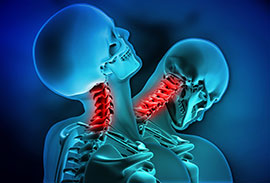Spinal Cord Injury
Securing Justice and Healing After a Spinal Cord Injury
Physical trauma to the back, neck, or head can lead to permanent damage to your spine. Damage to the spinal cord can impact every aspect of your life.
The physical changes will affect you mentally, emotionally, financially, and socially. If someone else was at fault, you're entitled to appropriate compensation. At Huber Thomas Law, we help you get the compensation and peace of mind you deserve.

Understanding a Spinal Cord Injury
A spinal cord injury (SCI) is a life-altering condition that occurs when there is damage to the spinal cord, the bundle of nerves housed within the spine that transmits signals between the brain and the rest of the body. Such injuries can lead to varying degrees of impairment, including:
- Loss of movement (paralysis)
- Loss of sensation
- Loss of function below the site of the injury.
The spinal cord does not have to be severed for a loss of functioning to occur; in many cases, it is intact but damaged.
Spinal cord injuries are categorized into two main types: complete and incomplete. A complete injury means no feeling or movement below the injury level. An incomplete injury means some feeling or movement remains.
A spinal cord injury affects more than just the body. It also impacts emotions, mental health, and social life. The severity of the injury and its location on the spine determine the extent of movement impairment. Higher injuries result in greater paralysis.
Types of Spinal Cord Injury
A spinal cord injury will vary not only in their location along the spine but also in the extent of the damage they cause. Different types of spinal cord injuries can affect how well someone can move and do daily tasks. The specific injury determines the best treatment and recovery plan for the person.
Spinal Cord Injury Levels Refer to the Location of the Injury in the Spine
These include:
- Quadriplegia: "Quad" means "four." It refers to the loss of movement and sensation in all four arms and legs. It may also affect a person's breathing ability. The injury usually occurs at the T1 vertebra or above.
- Paraplegia: "Para" means "two," and refers to the loss of sensation and movement in both legs. The injury usually occurs at the T1 vertebra or below.
- Triplegia: Involves motor and sensory loss in both legs and one arm. It usually results from an incomplete injury.
Immediate and Ongoing Treatment Strategies for a Spinal Cord Injury Post-Accident
Treating a spinal cord injury involves a multifaceted approach, focusing on stabilizing the patient, preventing further injury, and initiating rehabilitation to maximize recovery. Here’s a look at the critical steps and therapeutic interventions involved in the treatment process.
At the Scene and Emergency Care
- Immediate Stabilization: First responders will secure the spine with a neck collar and backboard. This is to prevent further injury. They will then transport the person to a hospital.
- Rapid Assessment: When you arrive at the hospital, they will perform tests such as MRIs and CT scans. These tests will help determine the severity of your spinal cord injury.
Acute Management
- Surgical Interventions: Surgery may be needed to take out bone pieces, foreign objects, bulging discs, or broken vertebrae pressing on the spinal cord. Surgery aims to stabilize the spine and minimize the risk of further injury.
- Medication: Doctors can administer large amounts of corticosteroids shortly after an injury to reduce swelling and protect the spinal cord.
Rehabilitation and Recovery
- Physical Therapy: This generally begins as soon as the patient is stable. The goal is to strengthen existing muscle function, improve mobility, and teach adaptive techniques for daily activities.
- Occupational Therapy: Focuses on enhancing independence by teaching skills and using adaptive equipment for everyday tasks.
- Speech and Language Therapy: If the injury affects breathing, speech, or swallowing, therapists will work with the patient to improve these functions.
- Psychological Support: Addressing the emotional and mental health impacts of a spinal cord injury is vital. Counseling and support groups can provide a network of support for patients and their families.
Long-Term Care Considerations
- Management of Secondary Conditions: Spinal cord injuries can lead to complications such as pressure sores, urinary tract infections, and spasticity. Ongoing medical care is crucial to manage these conditions.
- Adaptive Technologies and Home Modifications: Wheelchairs, voice-activated devices, and home modifications like ramps and widened doorways can significantly improve quality of life.
- Community and Social Reintegration: Programs and resources that support reintegration into social, educational, and employment settings are critical for the long-term well-being of individuals with spinal cord injuries.
Healing from a spinal cord injury takes time and involves a group of healthcare workers providing complete care. Recovery can be tough, but medical advances and rehab techniques are helping people affected by improving outcomes.
Recognizing the Symptoms of a Spinal Cord Injury
The symptoms of a spinal cord injury can vary widely depending on the severity and location of the injury. Immediate recognition and prompt medical intervention can significantly influence the recovery process. Here are the key symptoms to be aware of:
- Loss of Movement: A common sign of a spinal cord injury is difficulty moving parts of the body below the injury site. This can include difficulty moving legs, feet, or toes. It may also affect the ability to move arms, hands, or fingers. In some cases, a spinal cord injury can result in paralysis of the affected body parts.
- Altered Sensation: Victims may lose feeling in their hands and feet, making it hard to feel hot, cold, or touch.
- Loss of Bowel or Bladder Control: An injury can affect the nerves that control bowel and bladder functions, leading to incontinence or difficulty in voiding.
- Exaggerated Reflex Activities or Spasms: Changes in reflexes can occur, resulting in spasms or exaggerated reflex activities below the level of injury.
- Changes in Sexual Function: Both men and women may experience changes in sexual function and sensitivity, as well as fertility issues.
- Pain or Intense Stinging Sensation: Damage to the nerve fibers in the spinal cord causes this symptom, which may manifest as pain or a stinging sensation.
- Difficulty Breathing, Coughing, or Clearing Secretions from Your Lungs: Injuries higher up the spine may compromise respiratory functions, requiring immediate medical attention.

It's critical to understand that spinal cord injuries can lead to symptoms not immediately apparent after an accident. Swelling and bleeding near the spinal cord can worsen after an injury. This can result in more severe symptoms in the hours or days following the initial injury.
If you think someone has a spinal cord injury, make sure they stay still and get medical help right away. Moving someone with a suspected spinal cord injury can lead to further damage and complications.
Major Causes of Spinal Cord Injury
Motor vehicle accidents are the leading cause of spinal cord injuries. They account for almost half of all new injuries every year.
Other major causes include:
- Falls, especially in the elderly
- Violence, such as gunshot wounds
- Workplace injuries
- Sports and recreational activities
- Accidents on motorcycles, bicycles, and boats
If you've experienced any serious trauma to the head or back, get immediate medical attention. A serious spinal injury isn't always obvious at first. Numbness or paralysis may come on gradually as swelling occurs around the spinal cord. Immediate medical help can help you avoid further damage.
The Long-Term Effects of a Spinal Cord Injury
Damage to the spinal cord requires lifelong medical care. Beyond the paralysis, these injuries can lead to:
- Bowel and bladder issues
- Circulatory problems, like low blood pressure and blood clots
- Sensory challenges
- Breathing problems
- Chronic pain
- Depression
- Sexual health
- Overall health and wellness
A coordinated medical approach is necessary. You'll need the support of friends and family, as well as occupational and physical therapists. You may need speech or breathing therapy, or surgery. You'll also need specialized medical equipment and assistive devices.
Together, though, these specialists can help you regain as much of your original functioning and independence as possible.
How Huber Thomas Law Can Help You After a Spinal Cord Injury
The aftermath of a spinal cord injury is both challenging and life changing. As you embark on the road to rehabilitation, understanding the intricacies of a spinal cord injury settlement becomes paramount.
This process includes paying for current needs and making a plan for all your future care and well-being. At Huber Thomas Law, we understand how serious injuries can affect all aspects of your life. We are committed to making sure you get the help and compensation you deserve.
Comprehensive Compensation for Lifelong Needs
A spinal cord injury settlement encompasses several key components, each aimed at addressing the multifaceted needs of the injured party:
- Rehabilitation Costs: The journey to regain as much independence as possible involves extensive rehabilitation. This includes therapy to help you adapt to new ways of living, like physical, occupational, speech, and psychological therapy.
- Lost Wages and Earning Capacity: Many spinal cord injury survivors face the daunting reality of not being able to return to their previous employment. Compensation for lost wages, as well as the potential decrease in earning capacity, is crucial for maintaining financial stability.
- Ongoing Medical and Personal Care: The need for medical attention extends far beyond the initial treatment period. Continued care includes check-ups, procedures, and personal assistance, all paid for by the settlement.
- Specialized Equipment and Home Modifications: Adapting your living environment to accommodate your needs is essential. Compensation can cover costs for wheelchairs, vehicle modifications, ramps, and home renovations to ensure accessibility and independence.
- Pain, Suffering, and Emotional Distress: Beyond the physical injuries, the emotional and psychological toll of a spinal cord injury is significant. Compensation for pain, suffering, and emotional distress recognizes the invisible scars left by such a life-altering event.
The Role of Expert Testimony and Legal Advocacy
At Huber Thomas Law, our approach to securing spinal cord injury settlements is thorough and evidence based. We collaborate with medical professionals, therapists, and financial advisors to build a compelling case. This case will demonstrate the extent of your injuries and outline the support you require. We want to explain how the injury affects your body, job, emotions, and life quality in a clear and detailed way.
Our skilled spinal cord injury lawyers in New Orleans have a history of success in personal injury cases. Our dedication to our clients goes beyond the courtroom. We provide a service focused on you, with no upfront fees. Our payment depends on winning your case, so we are motivated to get the best result for you.
Let Us Be Your Advocate
If you or a loved one has suffered a spinal cord injury due to someone else's negligence, it's crucial to understand your rights and the compensation you may be entitled to. Recovery is hard, but Huber Thomas Law can help you through it. You don't have to go through it alone.
Contact us today to talk about your situation. We can help you get compensation and peace of mind as you recover and seek justice




